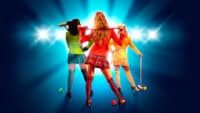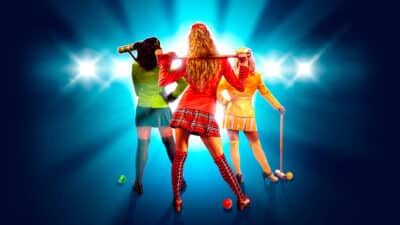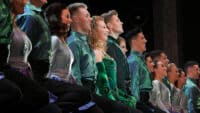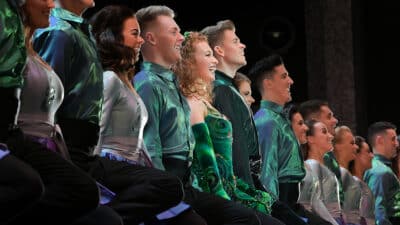Interview
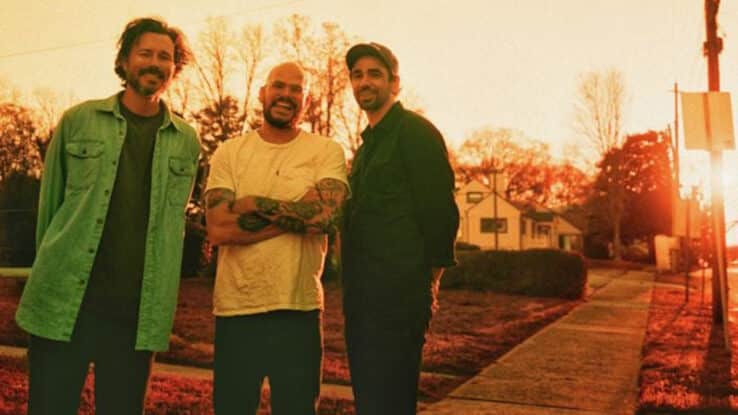
Interview
Stage Times: Microwave
Nathan Hardy walks us through his gig history – from vital lessons learnt in San Diego to life-changing hometown shows
Starting out in Atlanta basements back in 2012, Microwave have felt like the outliers of their scene ever since the release of their debut album, Stovall. Formed shortly after frontman Nathan Hardy’s disassociation from the Mormon Church, over the last decade the trio have forged a bluesy alternative rock sound with all the searing emotional punch of Jimmy Eat World and Nirvana, crafting shimmering verses that bleed into furious choruses.
Guided by Hardy’s playfully poetic songwriting, his vocal delivery slipping between high screams and delicate falsettos, 2019’s Death Is A Warm Blanket radiated with sheer aggression, but on their fourth studio album – Microwave are dialling things down a notch.
Its title derived from a conservative politician’s take on drugs in 1970, Let’s Start Degeneracy is a free-spirited record that meanders between emo, ambient pop, R&B, psychedelia, and folk influences, loaded with revelations that came to Hardy throughout the pandemic.
“During that time, I started to grow mushrooms, and I would always test everything myself to make sure it was good,” he explains.
“Our drummer, Tito [Pittard] and I were doing these heroic doses, and it’s a similar experience to doing ayahuasca ceremonies in Peru… You’re not taking it and then hanging out with your friends; you’re closing your eyes and experiencing the overwhelming feelings. Psychedelics have had a big influence in my life, especially having been raised Mormon. It’s allowed me to reimagine my life in a way that has had a lasting change.”
For a band who have often basked in feelings of hopelessness, the result is a collection of songs glistening with a newfound positivity. Emerging from a period of personal and sonic rediscovery, Let’s Start Degeneracy marks a bold new era for the three-piece, one that embraces experimentation and strives for happiness.
With Microwave heading out on a run of co-headline shows with Ontario’s The Dirty Nil in April, we sat down with Hardy to look back at their gigging careers, from last-minute shows in gothic gay bars to overcoming performance anxiety.
The gig that made me want to play music
One of the first shows that I went to was the Linkin Park Meteora world tour. They played with Hoobastank, P.O.D, and Story Of The Year, who were all bands that I loved from hearing the rock radio stations in Atlanta. I think that show had an impact on me, but not as much as seeing As Cities Burn and Manchester Orchestra did. Those were both bands who I directly adapted my style of singing and screaming from, and they were a big influence on me. I grew up very religious and was raised as a Mormon, and when I heard Manchester Orchestra and As Cities Burn, their style of singing immediately clicked for me. Both of those bands are fronted by people who learned how to sing at church, and they’ve been singing since they were little kids. They have that inflection that comes from Christian music, so when I heard that I was like, ‘I can sing like that, I’ve been doing that forever!’. Before that, I was really into bands like Circa Survive and Chiodos, and I was trying to belt out my vocals. I realised that a bluesy soul-influenced vocal felt more natural to me, and that’s where it clicked.
Was it easy to see parts of yourself and your upbringing in musicians like Andy Hull, then?
For sure. Manchester Orchestra are also from the same area that we’re from, in the suburbs north of Atlanta. There was a familiarity to that, and they’re exactly the kind of people that I would have encountered in high school.
The first
It would have been in late 2012 either at Swayze’s – the local venue in Marietta, Georgia – or a house show in Atlanta. We played a lot of house shows in this one DIY space, and we must have played there 10 times in the first couple of years of being a band. It was a very different dynamic back then, and there’s been a lot of evolution in how Microwave performs live. When we recorded our first EP, we didn’t even use a click track, so when we played live, I would just scream everything. I’d even scream parts that I was singing on the recording, just because we didn’t rehearse as much. We relied on the sheer energy of going ham at the show instead of trying to control it and make it sound good.
Were you always a natural performer, or is that a side of your career that you’ve had to grow into?
I had to grow into it. All of us in the band get performance anxiety, but it’s slowly been dulled over the course of playing so many shows. Once you’ve played enough, it becomes more of a muscle memory and you gain some confidence, but even now I get anxious 15 minutes before we go on. I don’t talk much between songs when we play shows because I have a stutter. It’s worse on some days than others, but there’s not really a common thread with it. I’ve gone to speech therapy since I was five years old, and it’s always been there. That’s probably fed into the performance anxiety.
The smallest
It would be a house show, and we played a tonne. There was a time where we played Exponent Manor in Nashville where, including the band, only around 20 people could fit in the living room. There was also a time where we played a gothic gay bar in South Carolina during the very early days of the band. We went to South Carolina because we were supposed to play a house show, but the person’s mom said that they weren’t allowed to put on a show there anymore. They were trying to relocate it at the last minute, and one of the guys involved worked with this bar in some capacity. He moved the show there, and we showed up to find people with leather harnesses and the whole deal. There were probably only 10 people there, but during our first two years as a band we played to 10 people a lot!
Did that knock your confidence at all?
Honestly, I think it built our confidence. There would only be a handful of people there, but usually they were all our friends, so we’d get hyped up by our peers. We put out Stovall in the middle of that timeframe, and I remember people coming up to us after shows and being like, ‘Wow, this actually sounds like music that people might like!’. When we were first starting out as a band, we were part of a scene that was somewhere between scramz and DIY emo. Everyone was influenced by Cap’n Jazz and American Football, but a lot of people were into more lo-fi punk-sounding recordings. With Stovall, we had this vision of leaning into a more modern-sounding production, more like Manchester Orchestra or Taking Back Sunday than the raw punk thing. When that album came out, people realised that we were ready to do bigger shows and seeing that grow was a confidence builder.
The biggest
Technically, our biggest show was with The Story So Far in Los Angeles in 2022. It was a 7,500-cap outdoor show at the Shrine Auditorium which sold out. Obviously, that was incredible, but I think the biggest crowd we’ve played to may have been at Slam Dunk Festival in the UK. We were playing on one of the covered stages in the afternoon, and it started raining so hundreds of people started flooding to our set under the covered area to get away from the rain. The British weather was working in our favour that day.
The worst
All the shows where I got too drunk to play. One of them was in San Diego with Brian Warren from Weatherbox playing a solo set. I got really drunk before we played, and I don’t really remember playing. I was a little over the threshold of being able to keep a note, that’s for sure.
Is that a lesson that you had to learn the hard way?
I learned it fast because I have a big self-shame and self-hatred kick when I hear back recordings. I’m hypercritical, but hearing ourselves back on people’s Instagram stories has always pushed us to try to sound better live. For the longest time, I would just yelp and scream onstage, which felt fine because it was on brand with the idea of emo music. A lot of the times when I felt like I played the worst set, people would say it was the best they’d ever seen us play. When I started to mess up, I would be mad at myself, and that energy of me beating myself up would translate to other people as me being extremely emotionally invested in the song. Over time, I realised that we’re in this microcosmic subgenre of music where people enjoy the dynamic of me screaming instead of trying to sing the lyrics, but if the average person heard that, they’d be like, ‘What the hell? Why would you pay to watch that?!’.
The best
We played Atlanta on our headline tour in April 2023, and we sold out The Masquerade, which is a 1,400-cap room. That show had such high energy, and there have been a handful of Atlanta shows where things have gone extremely well for us. That whole tour pretty much sold out, and the Atlanta date was the last show. It was the biggest room of the tour too, and they took a risk by bumping it up to a 1,400-cap room, but it still sold out. People flew in to see us at a hometown show, and it was so special. The best shows are always the ones where the crowd brings the energy, because I think people decide how good the show’s going to be before you even start playing. If the crowd has the right energy, we can’t play a wrong note, they’ll just eat up. We could play the worst set of our lives and people would still be ecstatic!
Microwave start their UK tour on 15 April. Find tickets here.
Let’s Start Degeneracy is out 26 April, available to preorder here.






